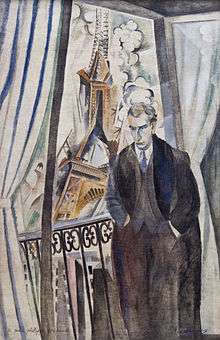Philippe Soupault

| French literature |
|---|
| by category |
| French literary history |
| French writers |
|
| Portals |
|
Philippe Soupault (2 August 1897, Chaville, Hauts-de-Seine – 12 March 1990, Paris) was a French writer and poet, novelist, critic, and political activist. He was active in Dadaism and later founded the Surrealist movement with André Breton.[1] Soupault initiated the periodical Littérature together with the writers Breton and Louis Aragon in Paris in 1919, which, for many, marks the beginnings of Surrealism.[2] The first book of automatic writing, Les Champs magnétiques (1920), was co-authored by Soupault and Breton. In 1927 Soupault, with the help of his then wife Marie-Louise, translated William Blake's Songs of Innocence and Experience into French. The next year, Soupault authored a monograph on Blake, arguing the poet was a "genius" whose work anticipated the Surrealist movement in literature.[3]
In 1933 at a reception at the Russian Embassy in Paris, he met Ré Richter and they decided to do some travel reportage together. Ré Richter’s photographs, taken with her 6x6 Rolleiflex, were to be published alongside Philippe Souault’s literary texts. In the years thereafter, the two of them continued in the same vein, travelling to Germany, Switzerland, England, Scandinavia and Tunisia. They married in 1937. The couple separated after the end of the war; he moved back to Europe and she remained in New York.[4]
He directed Radio Tunis from 1937 to 1940, when he was arrested by the pro-Vichy regime. He fled successfully to Algiers.
After imprisonment by the Nazis during World War II, Soupault traveled to the United States, teaching at Swarthmore College but returned subsequently to France in October 1945.[5] His works include such large volumes of poetry as Aquarium (1917) and Rose des vents [compass card] (1920) and the novel Les Dernières Nuits de Paris (1928; tr. Last Nights of Paris, 1929).[5]
In 1957 he wrote the libretto for Germaine Tailleferre's opera La Petite Sirène, based on Hans Christian Andersen's tale "The Little Mermaid". The work was broadcast by French Radio National in 1959.
In 1990, the year Soupault died, Serbian rock band Bjesovi recorded their version of his poem Georgia in Serbian.[1]
Soupault's short story "Death of Nick Carter" was translated by Robin Walz in 2007, and published in issue 24 of the McSweeney's Quarterly.
In 2016, City Lights published a book of his essays entitled Lost Profiles : Memoirs of Cubism, Dada, and Surrealism as translated by Alan Bernheimer.
Works
- Aquarium (1917)
- Rose des vents (1919)
- Les Champs magnétiques, (1919, in association with A. Breton)
- L’Invitation au suicide (1921)
- Westwego (1922)
- Le Bon Apôtre (1923, novel)
- Les Frères Durandeau (1924, novel)
- Georgia (1926)
- Le Nègre (1927, novel)
- Les Dernières Nuits de Paris (1928, novel).
- Le Grand Homme (1929, novel)
- Les Moribonds (1934, autobiographical novel)
- Il y a un océan (1936)
- Odes à Londres bombardée (1944)
- Le Temps des assassins (1945, sequel of autobiography)
- Odes (1946)
- L’Arme secrète (1946)
- Message de l'île déserte (1947)
- Chansons (1949)
- Sans phrases (1953)
- Profils perdus (1963)
- Lost Profiles: Memoirs of Cubism, Dada, and Surrealism. Translated from the French by Alan Bernheimer (City Lights Publishers), 2016 ISBN 9780872867277
- Arc-en-ciel (1979)
- Mémoires de l’oubli (1981, autobiography)
- Poèmes retrouvés (1982)
References
- 1 2 Philippe Soupault in the Encyclopædia Britannica
- ↑ Montagu, J. (2002). The Surrealists. Revolutionaries in Art and Writing 1919–35. London: Tate Publishing
- ↑ Keith Aspley,"Blake, William", in Historical dictionary of surrealism. Lanham: Scarecrow Press, 2010. ISBN 9780810874992 (p. 71)
- ↑ bauhaus 100
- 1 2 Keith Aspley, "Soupault, Philippe", in Historical dictionary of surrealism. Lanham: Scarecrow Press, 2010. ISBN 9780810874992 (pp. 446–48)
External links
